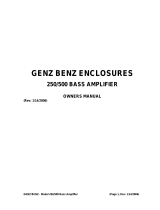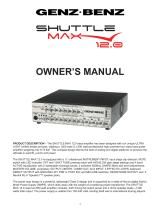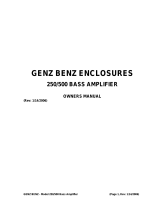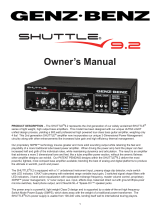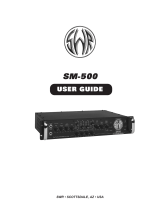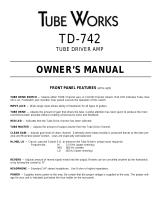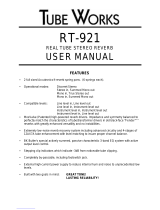Page is loading ...

- 1 -
DESIGN PHILOSOPHY
With many years of experience designing and manufacturing both bass guitar speaker cabinets and am-
plifiers, it became obvious that there is a large market for a bass amplifier line that reproduces the natu-
ral tone of the instrument itself, while allowing for personalization of tonal texture.
As with our speakers, Genz Benz amplifiers strive to maximize your instrument’s natural tone and feeling
without imparting additional coloration or reducing impact and playability. This results will always be true
to your instrument’s basic natural qualities and your personal tonal signature.
The circuit design, features and physical construction have been carefully calculated to give you, the ex-
perienced player, the best performance and value in bass guitar amplification. Featuring sturdy jacks and
controls, solid state preamp and shaping filters, 5 band active EQ, a balanced direct output and an in-
dustrial duty bipolar power amplifier with toroidal power transformer, the Genz Benz GBE 400 bass am-
plifier gives you the tools and versatility necessary to sound your very best on stage.
GBE 400 FRONT PANEL
GBE 400 BACK PANEL
TECHNICAL MANUAL

- 2 -
TECHNICAL INFORMATION
The first stage of the GBE 400 preamp uses a low noise bi-fet linear scaling amplifier with a 2 pole low
cut point at 23 Hz to prevent excessive speaker cone excursion and intermodulation distortion. Addi-
tional bandwidth roll-off is provided at 20 kHz for RFI suppression. The variable gain stages are a feed-
back-divider type control, providing a maximum gain of about 30 dB. The input stage feeds the three
signal shape circuits and then the five band active EQ. These EQ filters provide over 12dB of boost and
cut. The preamp output feeds the master volume control and fully protected power amplifier. A low noise
differential drive output amplifier is provided for the direct output (switchable pre/post eq and ground lift)
and is phantom power protected.
The power section consists of a low distortion bipolar power amplifier with integrated limiter which allows
gradual overload without sudden loss of feedback control of the speakers. The output is rated at 275
watts RMS at 8 ohms, 330 watts RMS at 4 ohms and 450 watts RMS at 2 ohms. The amplifier topology
is low feedback class A-B with servo control of bias and DC offset.
Also provided is on board output limiting, dual slope integrated VI limiting, solid state thermal protection,
short circuit load protection, DC fault protection and RFI suppression. All amplifier status points are indi-
cated on a dual color led array. This amplifier uses heavy duty copper based bi-polar power transistors
directly mounted to a fan cooled extruded aluminum heatsink tunnel.
An important and not commonly discussed specification is the power amplifier’s ability to deliver rated
power into a reactive load. All speakers present a reactive load to the amplifier, reducing real world driv-
ing ability. The GBE 400 automatically compensates for this effect. The power section of the GBE 400
amplifier is rated to deliver full power into a reactive load with a 45 degree (leading or lagging) power
factor phase angle. This is one important reason Genz Benz amplifiers sound so big.
FEATURES
The following feature set is included on the GBE 400 Bass Amplifier. These features were developed
based on usability and are the result of input from veteran players from around the country. It is impor-
tant for an amplifier to reflect the real needs of the players using them. We feel that this amplifier does
just that.
Input — The ¼” input has switchable sensitivity. With the switch in the passive position, the preamp pre-
sents a higher gain and input impedance which is tailored to the characteristics of passive pickups. Two
distinct types of passive pickup exist (there are some exceptions which aren’t important for this discus-
sion). A passive magnetic pickup consists basically of a permanent magnet (or one for each string),
called a pole piece, with a wound wire coil around it. As the string interrupts the magnetic field, the coil
picks up the changes, or disturbances, in the magnetic field and translates these changes into a small
electrical signal. (This is the same principal as the large electrical generator used by your utility company
to power your rig on stage!) In order to develop a strong enough signal to drive an amplifier, the number
of windings on the coil(s) must be very large. Additionally, in order to keep the efficiency of the pickup
high, the dimensions of the wire coil must be small and the magnet flux density kept very high, thus, a
small diameter wire is used. The end result is a signal that has significant output impedance due to the
size and length of the wire used in the pickup’s windings. A passive piezo-ceramic or piezo-film pickup is
made of a piezo-ceramic crystal (or distorted Kynar film). When this material is moved by the vibration of
instrument’s body, the resulting strain on the crystal or film is converted to voltage via the “piezo-electric
effect”. The output impedance of a piezo type pickup is typically higher than the magnetic pickup. The
input impedance of the amplifier’s passive input is set high enough to prevent interaction with the high
output impedance of all commonly used passive pickups, including magnetic, piezo-ceramic and piezo
film types.

- 3 -
With the switch in the active position, the preamp presents a lower gain and input impedance which is
tailored to active pickups. An active pickup is, for all practical discussions, any pickup that uses pre-
amplification between the pickup element and the amplifier input. The purpose of this pre-amplifier is to
buffer the high impedance signal from the pickup element (magnetic, piezo-ceramic, piezo-film etc) and
convert it to a higher level, lower impedance form. It is common for a bass with active pickups to have
higher output level and longer sustain because only a small portion of the energy is required to make the
electrical signal comes from the vibrating string. The majority of the energy comes from an external
power source such as a battery. Additional features may be provided with the active pickup, such as
equalization, volume control and compression.
Input Signal Mute Switch — The input on the GBE 400 bass amplifier includes an “input mute”
switch. With this switch, you can place the amplifier (and the direct output) in standby mode between
sets without having to change any of your volume settings. This feature is especially handy when using
the tuner output since you will still be able to use your tuner without having sound come from the ampli-
fier or P.A. system. No more re-patching or fumbling in the dark! A red LED turns on when the input
mute is active, reminding you that you are in “stand-by” mode.
Input Gain Control & O/L LED — The “input gain” control, in conjunction with the signal and clip LED,
allows you to adjust the preamp input gain sensitivity to the instrument you are playing. Basses can
have an output level from a few thousandths of a volt to several volts. Generally, you want to see only
an occasional flash of the red clip LED when you really hit the string hard, then adjust the master volume
control for playing volume. Distortion of the preamp gain stage will occur when the red clip LED is illumi-
nated, so plan accordingly. The best signal to noise ratio will result with the above method.
Signal Shaping Switches — There are 3 separate shaping filters on the GBE 400. The “L.F. EXTEND”
lowers the low frequency roll-off response of the preamp (between 30 and 45 Hz) to allow the full effect
of 5+ string and extended scale instruments. The “MID SCOOP” function introduces a midrange scoop
at approximately 800 Hz, with a lower “Q” than typical equalization provides. The “H.F. ATTACK” func-
tion increases brightness and sparkle (approximately 4KHz) of the signal, allowing exaggeration of per-
cussive effects and string sound.
Active 5 Band Equalization — The “active 5 band equalization” used in the GBE 400 amplifiers is com-
posed of 1 shelving low frequency control, 3 peaking midrange controls and 1 shelving high frequency
control. These filters are not interactive and are effective as an advanced tone control system. The filters
have a cut/boost range of +/- 12dB and a smooth, musical sounding response.
Low Frequency - 80 Hz
Low-Mid Frequency - 200 Hz
Mid Frequency – 500 Hz
High-Mid Frequency – 1250 Hz
High Frequency - 4000 Hz
Tuner Output Jack — The “tuner output jack” is provided to allow a tuner to remain plugged into the
amplifier while playing. This output remains active when the “mute switch” is pressed, allowing for tuning
your instrument while not sending signal to either the “direct output” or the speaker. Signal level of -30dB
(typical hot bass level) will drive all known tuners.
Effects Insert Jacks — The “effects insert jacks” are provided to allow access to the pre-equalization
signal for the purpose of inserting signal processing equipment such as compressors, chorus, delay &
reverb processors. “Send” (output) and “return” (input) are nominal +4 dB level. “Series” devices (such
as compressors and gates) require that the signal flow out from the send jack on the amplifier, through
the processing device and back into the return jack on the amplifier. Parallel or mixed signal devices
(such as chorus, delay and reverb processors) require that the signal flow out of the send jack on the
amplifier, through the unit where it is split into a dry (unaltered) signal and a wet (processed) signal.

- 4 -
On the processing unit, you will use the mixed signal output to return the signals (both wet and dry) to
the return jack on the amplifier. The ratio between the wet signal and the dry signal is heard as the
amount of effects added back to the original signal, which is controlled by the mix knob (also called
“balance”) on the effects processor. This may be a real knob (as in the Alesis Microverb), or software
controlled (as in the Yamaha SPX-90, SPX900 or SPX 990). Set the input sensitivity on the effects proc-
essor according to the processor manufacturer’s instructions. The “effects send jack” may also be used
as an auxiliary output to drive a direct box, tape deck etc. This output is pre-equalization, and pre master
volume. The “mute switch” will shut this output down when engaged.
Master Volume — The “master volume control” is post-eq, and adjusts the signal level sent to the
power amplifier. Best results are usually obtained when this control is set between the 9 o’clock and 3
o’clock position.
Master Section Status Indicators —
• The “power LED” indicates that the amplifier is on and the low voltage regulated power supplies are
active.
• The “protect LED” indicates that the amplifier is in “protect” mode and the output relay is de-
energized. This LED will illuminate for approximately 3 seconds during power switch-on and switch-
off. It is normal for this LED to glow while continuing to monitor the internal conditions for about 3
seconds after the protection relay has closed. It will also illuminate during any internal fault condi-
tion. If this happens, turn the amp off and consult a repair technician.
• The “thermal LED” indicates that the amplifier has overheated, engaged the protection circuit and
shut down. This circuit is self-resetting when the offending condition (blocked air vents, foreign body
stuck in fan, etc) is corrected. This LED will also flash for a brief time at turn-on and turn-off, indicat-
ing that the amplifier protection circuits are operating. This LED will illuminate about 15 degrees F.
before amplifier shut-down.
• The “signal LED” indicates that the power amplifier is receiving signal (over several watts output)
and all is well!
• The “limit LED” indicates that the power amplifier has reached maximum power and the limiter
threshold has been crossed. Driving 6dB beyond this point, the amplifier will gradually begin to clip.
• The “output limit switch” engages or bypasses the internal soft clip limiter. This limiter allows simula-
tion of output saturation as the amplifier nears its maximum power. The limiting action is particularly
musical sounding, even when driven hard.
Direct Output — The GBE 400 includes a studio quality, fully active transformerless balanced “direct
output”, with “pre-post equalization switch”.
With the “pre/post switch” in the “pre” position, the direct output receives its signal directly from the pre-
amp input buffer amplifier with no tonal modifications. This is a pre gain control, pre eq output, with the
best signal to noise ratio. Most recording and sound reinforcement companies will want to use this posi-
tion since changes you make to your stage sound will not affect this output.
With the “pre/post switch” in the “post” position, the direct output receives its signal from the output of
the 5 band equalizer. This feature allows for additional flexibility in some situations, but is often not de-
sired for recording or live sound reinforcement.
A “ground lift switch” is provided which opens pin 1 (shield) on the direct output to prevent ground loops.
Use the position that results in a minimum of noise.

- 5 -
The output level is nominal line level (adjustable between -50 and -10 dB), pin 2 hot. This output is fully
protected from the effects of phantom power provided by the mixing console and does not require phan-
tom power to operate.
Output Jacks — The GBE 400 features 2 standard 1/4” speaker jacks plus 2 Neutrik ™“Speakon” NL-4
connectors. Minimum recommended total load impedance is 2 ohms provided adequate ventilation for
the heatsink area is provided. The “Speakon” is wired using pins 1+ and 1-, pins 2+ and 2- are not con-
nected.
GENERAL SAFETY INFORMATION
Power is supplied to the amplifier through an IEC type detachable cord set with a mains connector, fuse
holder and internationally rated 115/230 Volts - 50/60 Hz toroidal power transformer. For our interna-
tional touring players, an external mains line voltage switch is provided, with a fuse size chart printed on
the rear of the unit denoting the power supply configuration and fuse size that the unit has been rated
for. International IEC type cord-sets are available for a variety of international power supply sockets.
The main’s fuse (and a spare) is located in a slide-out drawer in the bottom half of the IEC connector.
Common sense (as well as the law) dictates that you do not operate the unit where it will be exposed to
moisture or rain, excessive ambient heat (over 115 degrees F / 40 degrees C) or without a properly
grounded A.C. power source. Never remove the ground pin from the A.C. power connector.
Ventilation is required to keep this amplifier from overheating. Do not block air flow over heat-sinks at
the rear of the unit.
CAUTIONS
• Never set an amplifier on anything that will tip over or collapse under its weight.
• These amplifiers are capable of producing sound pressure levels that may cause permanent hearing
loss.
• There are no user serviceable parts inside these units. Always consult a qualified service repair fa-
cility for service. THE HEATSINK MAY BECOME VERY HOT!!! WARNING!! DO NOT TOUCH
The use and operation of this device constitutes an agreement of full release of any and all liability con-
nected with its use. Only persons familiar with the operation of high-powered audio equipment should
attempt to operate this device. In addition, by the use of this device, user agrees to hold both GENZ
BENZ ENCLOSURES, INC and its designers, sales agents and all other affiliates and related parties
harmless in the event of any accident, injury, damage or loss resulting from such use. Manufacturer’s
sole responsibility is to provide a warranty on the specified performance of the product under normal
conditions for a period of 3 years.

- 6 -
THREE YEAR LIMITED WARRANTY
TRANSFERABLE
Genz Benz warrants the GBE 400 speaker enclosures and electronics to be free from defects in materi-
als and workmanship, for a period of 3 years from the date of purchase, when purchased from an au-
thorized Genz Benz dealer.
This warranty does not cover wear and tear incurred from the normal designed use of the product.
This warranty is only effective if a copy of the original sales receipt is presented at the time of warranty
service.
This limited warranty is completely transferable to any subsequent buyer as long as the original sales
receipt is transferred to such subsequent buyer. See your warranty card for all details.
ALL WARRANTY SERVICE MUST BE PERFORMED BY A GENZ BENZ AUTHORIZED SERVICE
CENTER. Before returning any unit to the manufacturer for service, a RETURN MERCHANDISE AU-
THORIZATION (RA#) must be obtained by calling 480-941-0705.
7811 E. Pierce St. Scottsdale, AZ 85257
Ph: 480-941-0705 Fax: 480-946-2412
www.genzbenz.com
/


